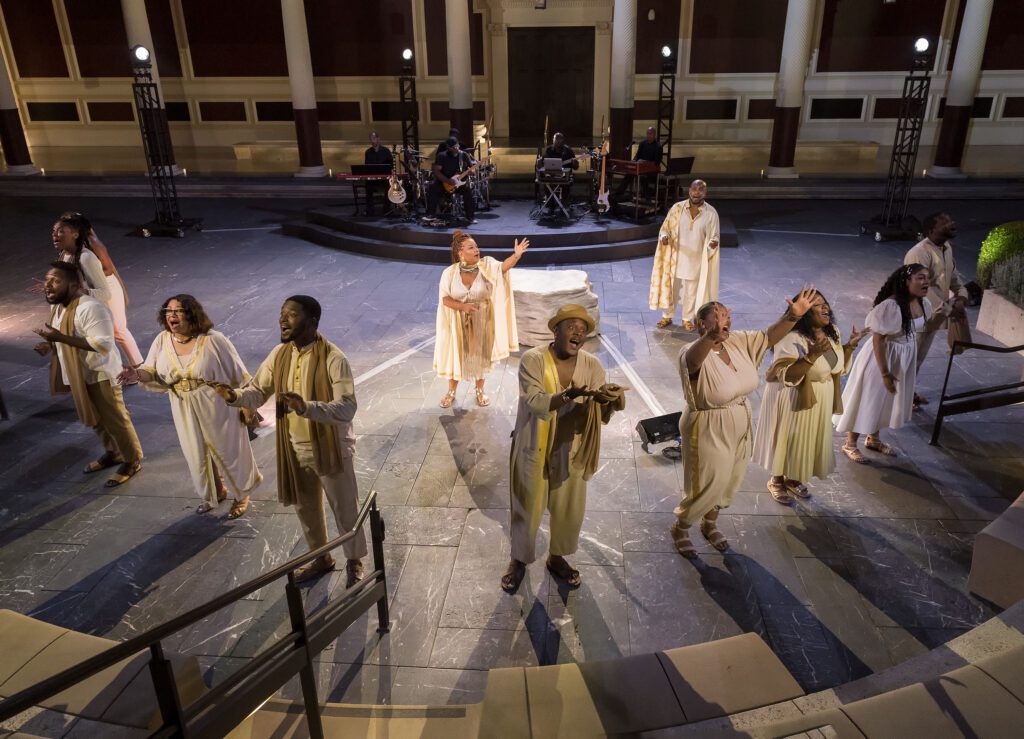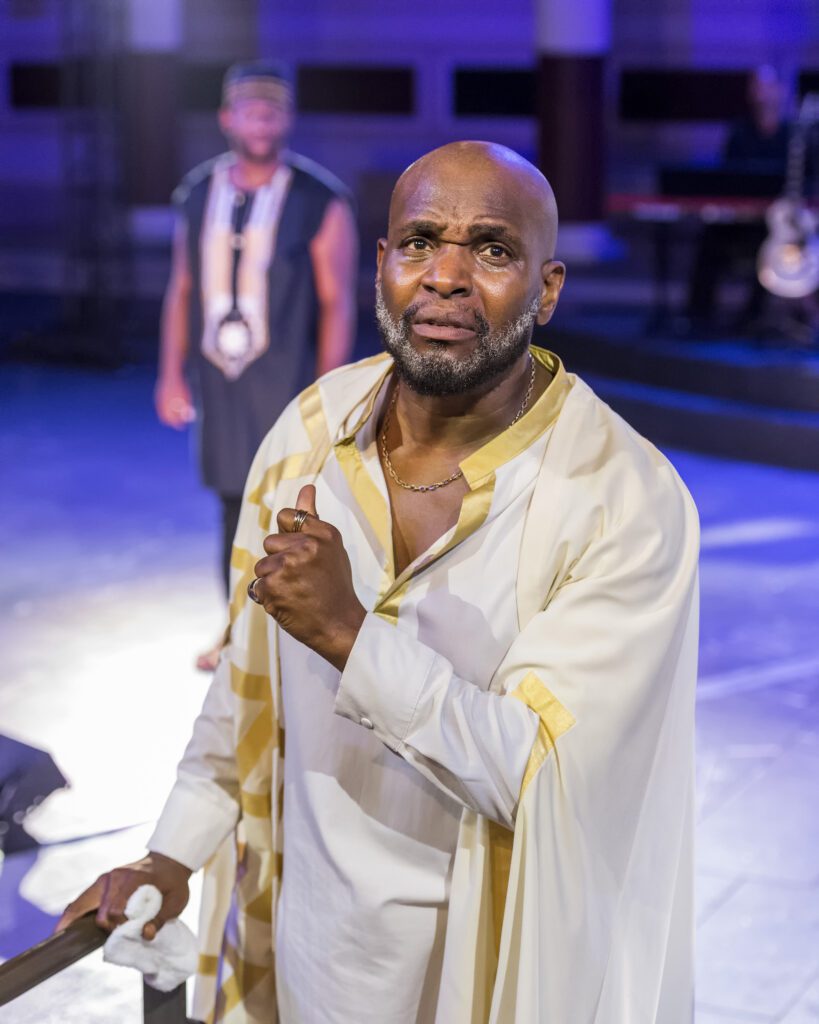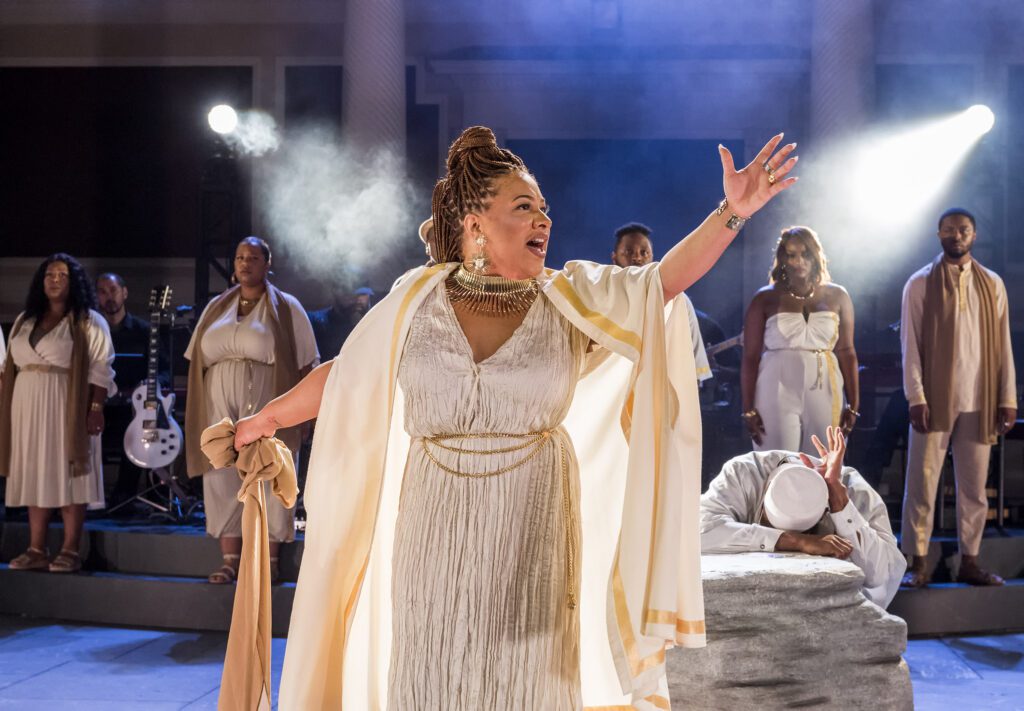Cultural Cocktail Hour
Review: The Gospel at Colonus at the Getty Villa
How Oedipus Got His Groove Back:
A jamming rendition of Sophocles at the Getty Villa
By
Leticia Marie Sanchez
Introducing the The Gospel at Colonus on opening night, J. Paul Getty Museum Director Timothy Potts wryly stated, “Sophocles doesn’t have to be a downer.” The Gospel at Colonus breathes life into an ancient work and at times, the production erupts into jubilant song and dance. The original narrative, set in Colonus, is actually Sophocles’ sequel to the dark, unsettling Oedipus Rex. So there’s no murder, hanging, or eye-gouging in this play. Instead, Oedipus at Colonus, written in 406 BC, centers on the exiled protagonist seeking redemption for the terrible sins accidentally committed in Oedipus Rex.

The cast of The Gospel at Colonus at the Getty Villa.
© Craig Schwartz Photography
What better than Gospel music to convey the longing for redemption? Modern re-stagings of classics can be hit or miss, but this interpretation was a hit because the Gospel metaphor embodies the play’s original theme. The production, which had a successful run in Chicago, was directed by Mark J,P Hood and Court Theater’s artistic director Charles Newell. It was adapted with original lyrics by Lee Breuer, in addition to music composed by Bob Telson. The vibrant Gospel music enhanced audience engagement. “It’s Ok, y’all can talk back,” one of the actors sassily instructed the audience on opening night, dismantling the invisible wall between performer and audience. Spurred on by his direction, members of the audience began spontaneously calling out words of encouragement to the singers on stage.
Not only does Gospel music underscore Sophocles’ theme of redemption, it also connects with the history of theater in antiquity. Ancient Greek theater occurred during religious festivals. The Greeks would sing hymns to their deities, including Dionysus, and the earliest performances may have even had priests as participants. Therefore, to have a character named the “Evangelist” links the modern version with the historical era of the original. Spiritual zeal is so deeply imbued in the fabric of the Gospel at Colonus that I was not surprised to discover that one of the most remarkable performers, Marks Spate Smith, is a real-life pastor. His rendition of Theseus was dazzling. His gravitas, charisma, and voice made him a captivating member of the cast.

Mark Spates Smith as Theseus in foreground, with Kai A. Ealy as Polyneices in background.© Craig Schwartz Photography
Another acting standout was Jessica Brooke Seals as the Evangelist. A fire lit up in Seal’s eyes when she recounted plot points to keep the audience up to speed. The gusto and flair with which Seals delivered her lines makes the Oedipus narrative come alive.

Jessica Brooke Seals as Evangelist in foreground, with Eva Ruwé as Chorus,Shantina Lynet’ as Chorus, Eric A. Lewis as Choragos, Kelvin Roston Jr. as Oedipus, Cherise Thomas as Chorus, and Isaac Ray as Chorus in background.© Craig Schwartz Photography
A minor critique is that there were moments in the production when a few of the casts’ voices were not as audible as they could have been during emotionally impactful scenes. It was hard to distinguish if this was done purposefully, to be staid and solemn, or if, in fact, a few of the singers had worn out their voices during rehearsals. A few hidden mics would be helpful to amplify the sound throughout the vastness of the Getty space.
The Gospel at Colonus at the Getty Villa is two performing arts experiences rolled into one: a deep dive into a Greek Tragedy and an exhilarating Gospel service. The second genre sheds light onto the first, rendering a dark, ancient narrative more accessible. A modern subtitle for this jamming interpretation: How Oedipus got his Groove Back.
Performances of The Gospel at Colonus will be held Thursdays through Saturdays, September 7–30, at 8pm, with previews on August 31–September 2, 2023, at 8pm. American Sign Language (ASL) interpreted performances will take place on September 14 and 21.
Tickets will be available online
https://www.getty.edu/visit/cal/events/oct_gospel.htmlor by calling (310) 440-7300.
The Gospel at Colonus is not recommended for children under the age of 8.













